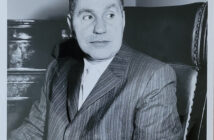This Sunday the Church of Jesus Christ of Latter Day Saints made a point of admonishing its members to respect the rules concerning their ritual of baptizing the deceased. This is the practice wherein a member of the Mormon Church receives the sacrament of baptism on behalf of a dead person with a direct blood tie to them. This extends the possibility of baptism to the deceased man or woman, who may chose to either accept or deny the sacrament in the afterlife.
Proxy baptism has drawn much fire lately from Jewish groups who object to Mormons posthumously baptizing members of the religion who died during the Holocaust, as well as recently deceased Jews like murdered journalist Daniel Pearl and Nazi Hunter Simon Wiesenthal. These Jewish groups complain that baptizing members of their faith is in conflict with Mormon teaching, as most (if not all) of these baptisms were done without participation of a living blood relative.
Jews are not the only people who have been incorrectly baptized. Several infamous examples of Mormons breaking the strict rule of only being about to baptize dead people directly related to a living Mormon have made the news. In 2009 the Mormon Church baptized Ann Dunham, President Barack Obama’s mother. She joins other recent baptismees like Gary Coleman, George Carlin, Steve Irwin and Pope John Paul II (who has been posthumously baptized six times).
So why do members of the Latter Day Saints do this ritual? Mormons believe in the supreme importance of receiving baptism, espousing that it is fundamental to salvation of the soul. Since there are many people who did not accept this sacrament during their lives, or perhaps even did not know such saving grace was available to them, The Latter Day Saints embraced a teaching that allows the dead to posthumously accept (or reject) baptism.




